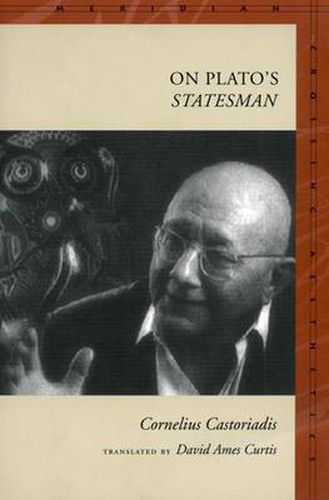Readings Newsletter
Become a Readings Member to make your shopping experience even easier.
Sign in or sign up for free!
You’re not far away from qualifying for FREE standard shipping within Australia
You’ve qualified for FREE standard shipping within Australia
The cart is loading…






This posthumous book represents the first publication of one of the seminars of Cornelius Castoriadis, a renowned and influential figure in twentieth-century thought. A close reading of Plato’s Statesman, it is an exemplary instance of Castoriadis’s pragmatic, pertinent, and discriminating approach to thinking and reading a great work: I mean really reading it, by respecting it without respecting it, by going into the recesses and details without having decided in advance that everything it contains is coherent, homogeneous, makes sense, and is true.
Castoriadis brings out what he calls The Statesman’s quirky structure, with its three digressions, its eight incidental points, and its two definitions, neither of which is deemed good. He does not hesitate to differ with the text, to show that what is, in appearance, secondary is really essential, and that the denunciation of the Sophists accommodates itself quite well to the use of sophistical procedures. Castoriadis shows how The Statesman takes us into the heart of what is distinctive in the late Plato: blending, acceptance of the mixed, of the intermediate.
These transcriptions of Cornelius’s afford the reader an opportunity to discover his trenchant, convincing, energetic, provocative, and often droll voice. Here is a hitherto unknown Castoriadis, who reflects as he speaks, collects himself, corrects himself, and doesn’t hesitate to revisit key points. In short, this is Castoriadis’s thinking in action.
$9.00 standard shipping within Australia
FREE standard shipping within Australia for orders over $100.00
Express & International shipping calculated at checkout
This posthumous book represents the first publication of one of the seminars of Cornelius Castoriadis, a renowned and influential figure in twentieth-century thought. A close reading of Plato’s Statesman, it is an exemplary instance of Castoriadis’s pragmatic, pertinent, and discriminating approach to thinking and reading a great work: I mean really reading it, by respecting it without respecting it, by going into the recesses and details without having decided in advance that everything it contains is coherent, homogeneous, makes sense, and is true.
Castoriadis brings out what he calls The Statesman’s quirky structure, with its three digressions, its eight incidental points, and its two definitions, neither of which is deemed good. He does not hesitate to differ with the text, to show that what is, in appearance, secondary is really essential, and that the denunciation of the Sophists accommodates itself quite well to the use of sophistical procedures. Castoriadis shows how The Statesman takes us into the heart of what is distinctive in the late Plato: blending, acceptance of the mixed, of the intermediate.
These transcriptions of Cornelius’s afford the reader an opportunity to discover his trenchant, convincing, energetic, provocative, and often droll voice. Here is a hitherto unknown Castoriadis, who reflects as he speaks, collects himself, corrects himself, and doesn’t hesitate to revisit key points. In short, this is Castoriadis’s thinking in action.